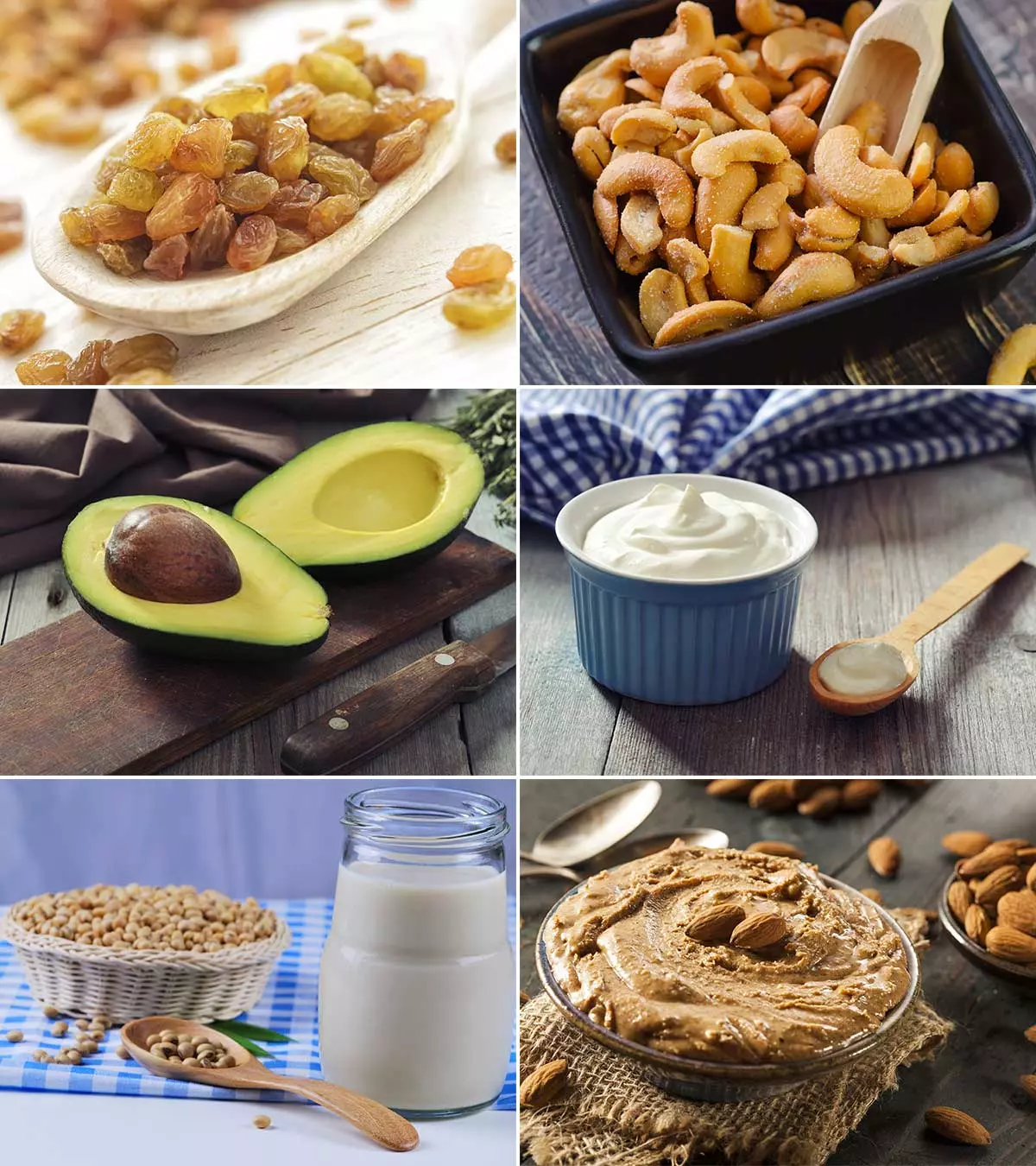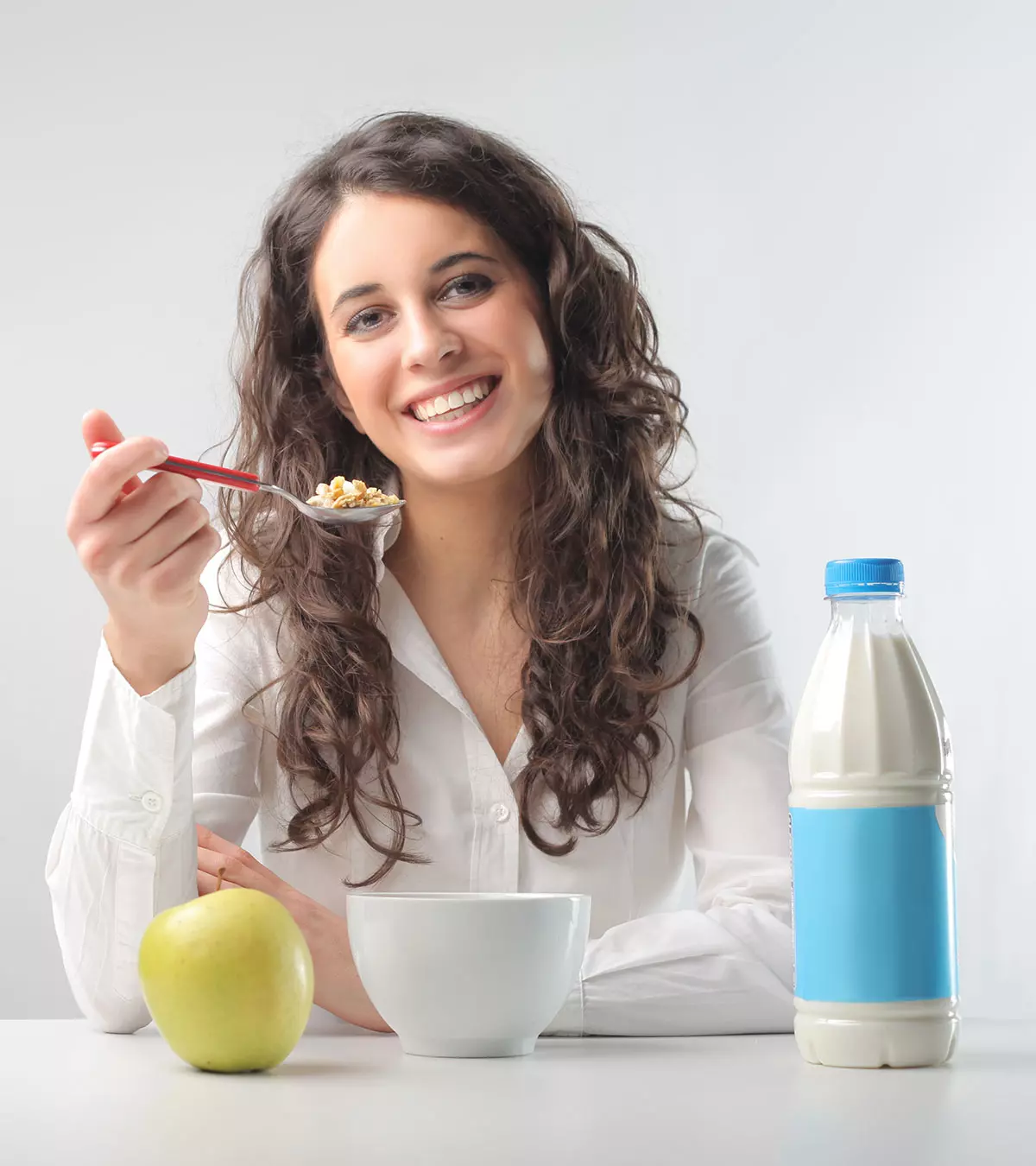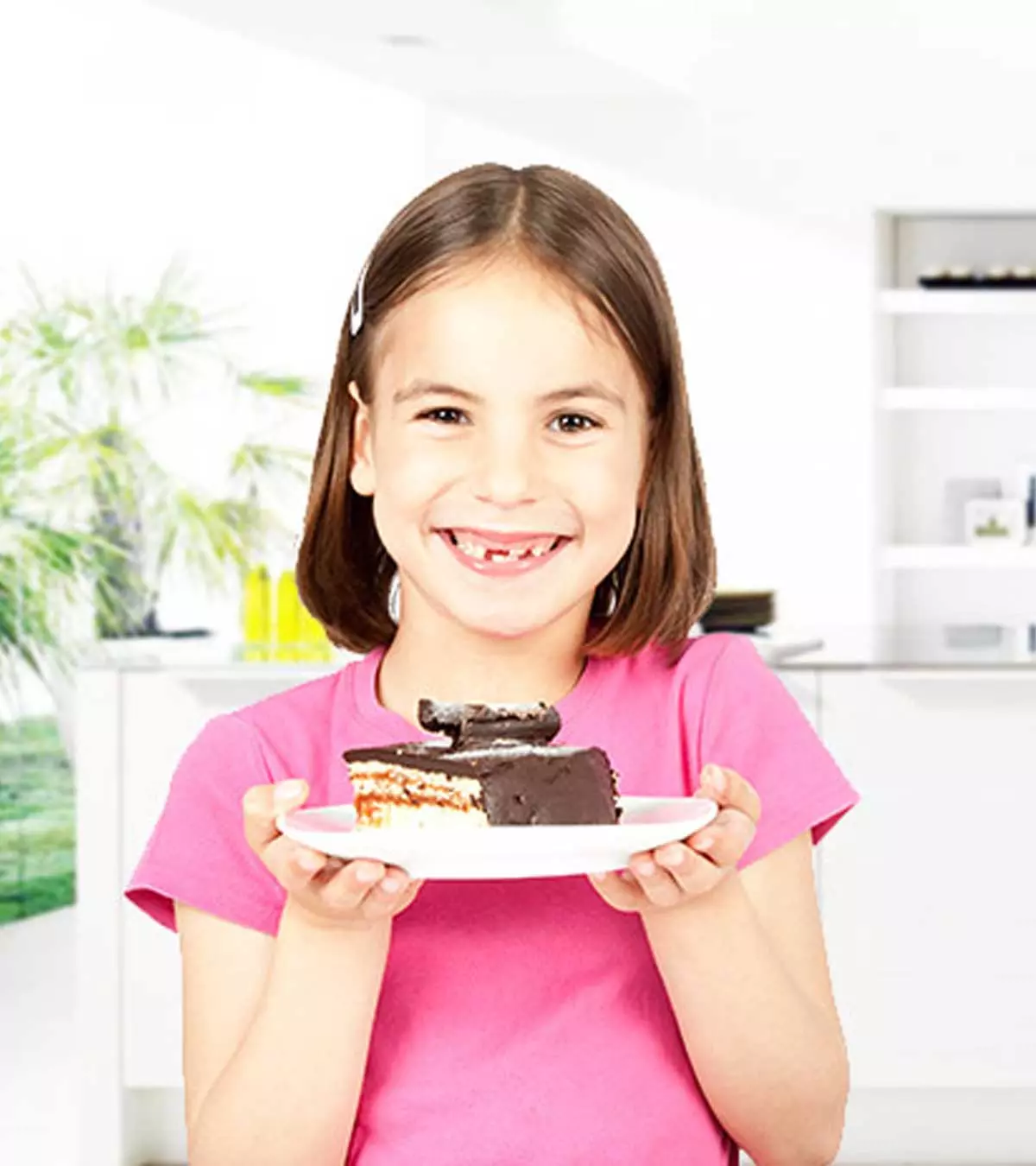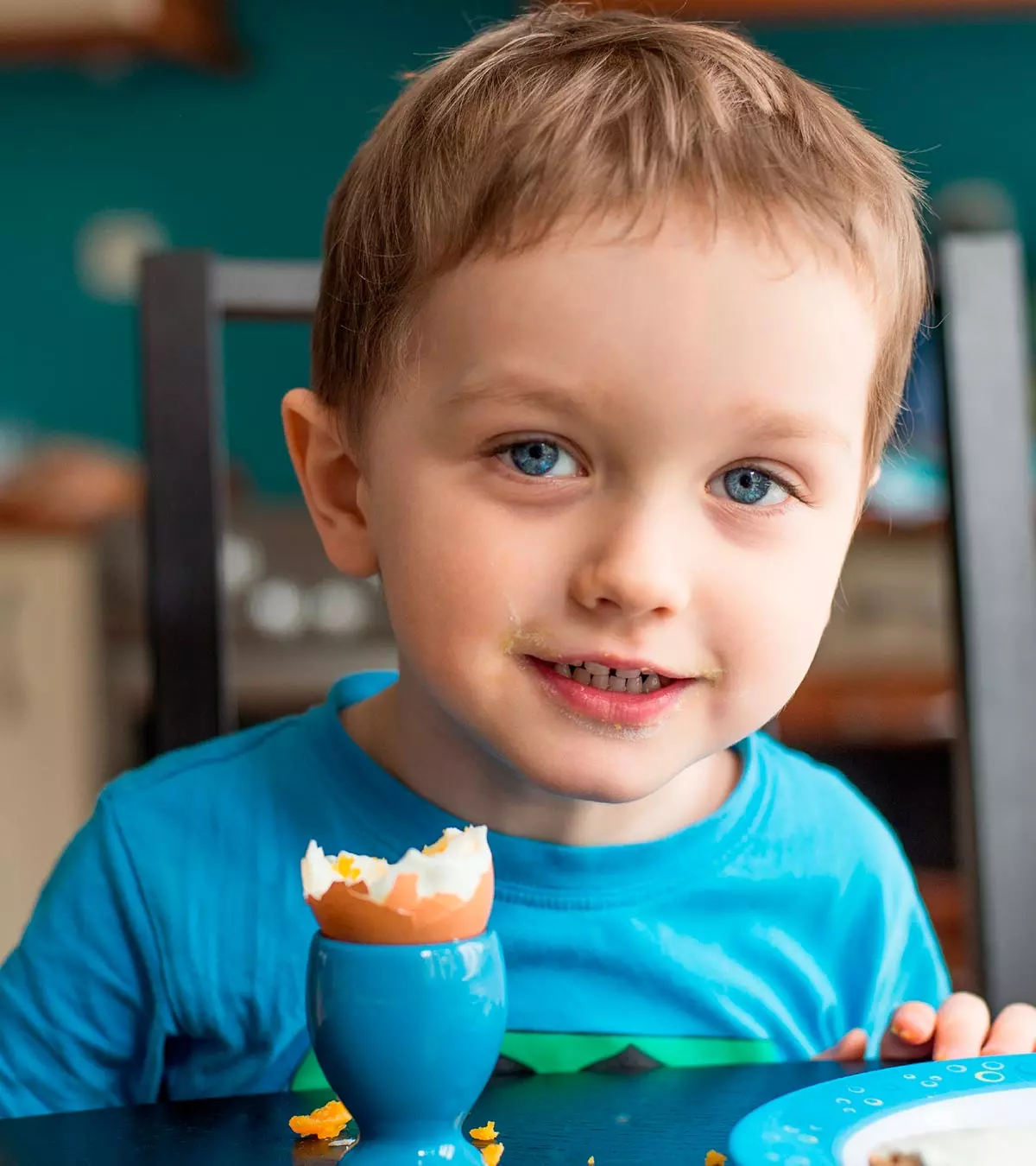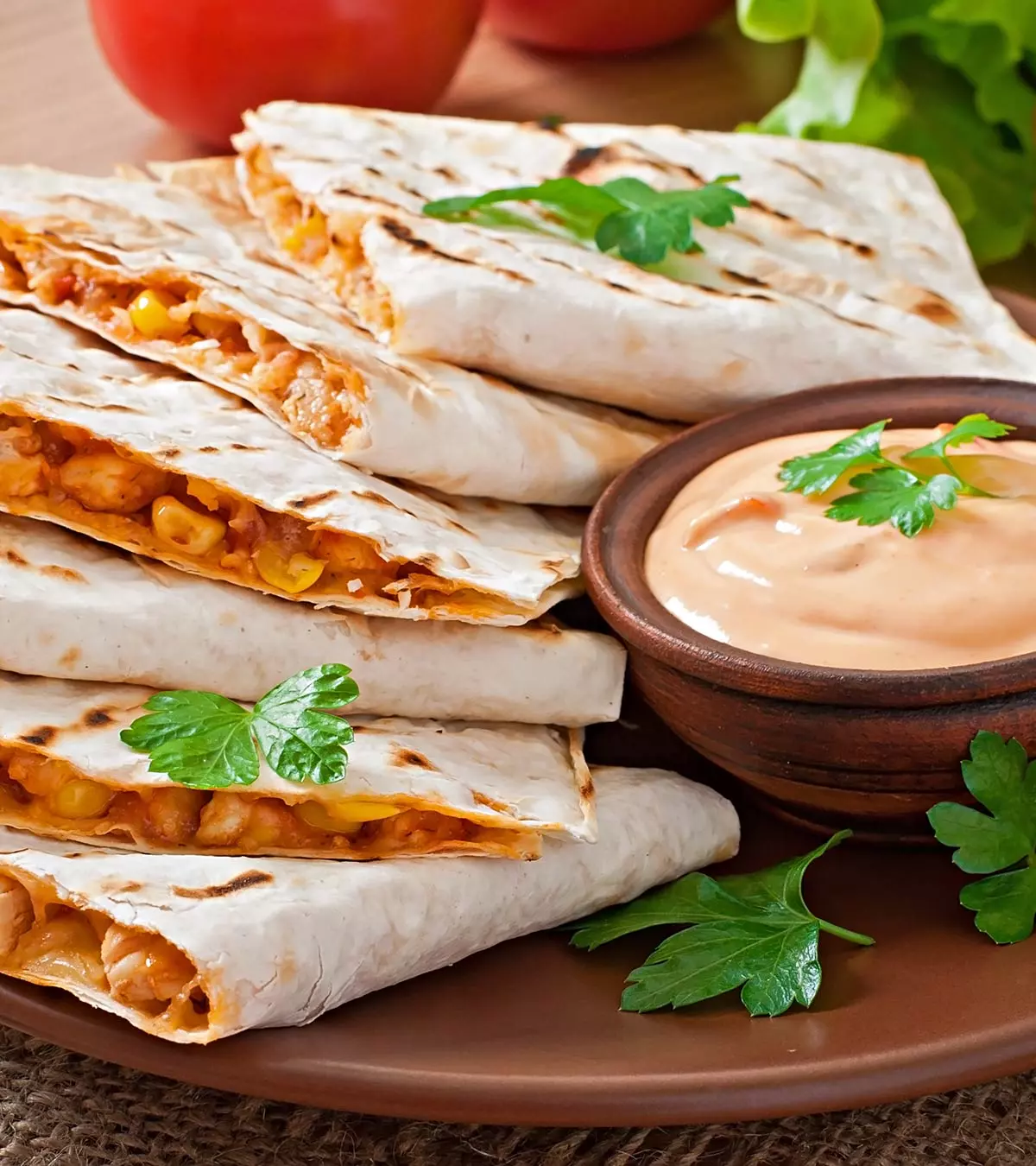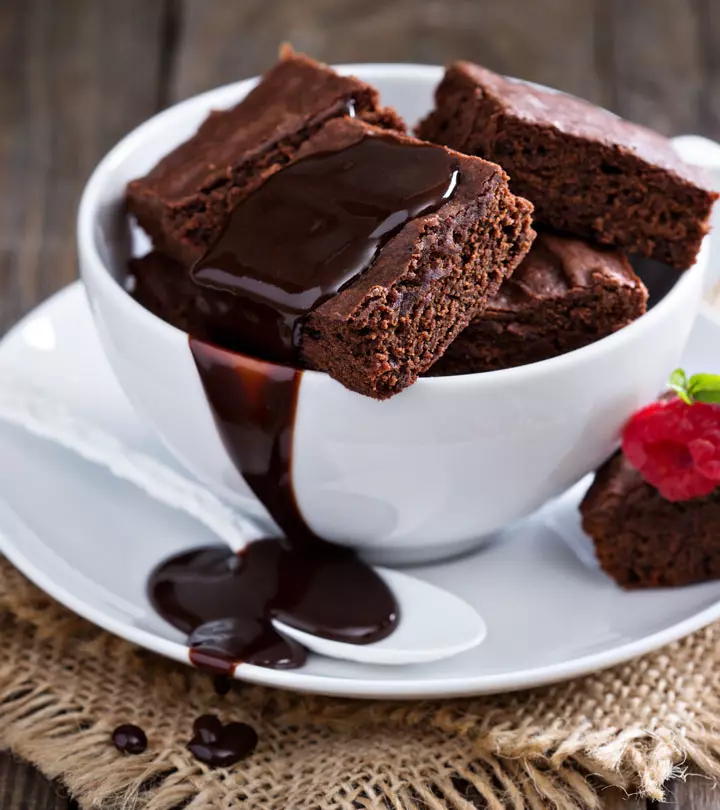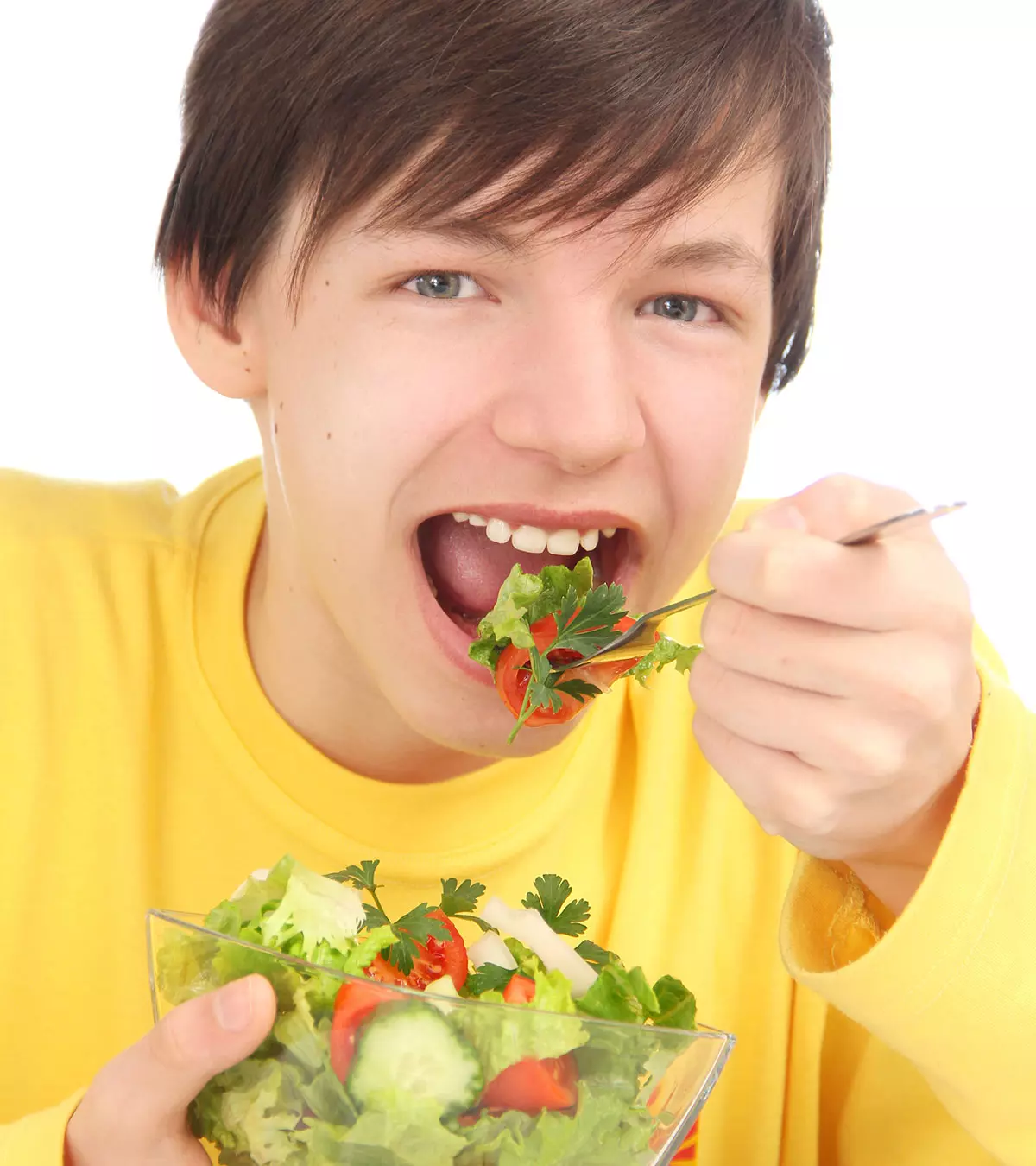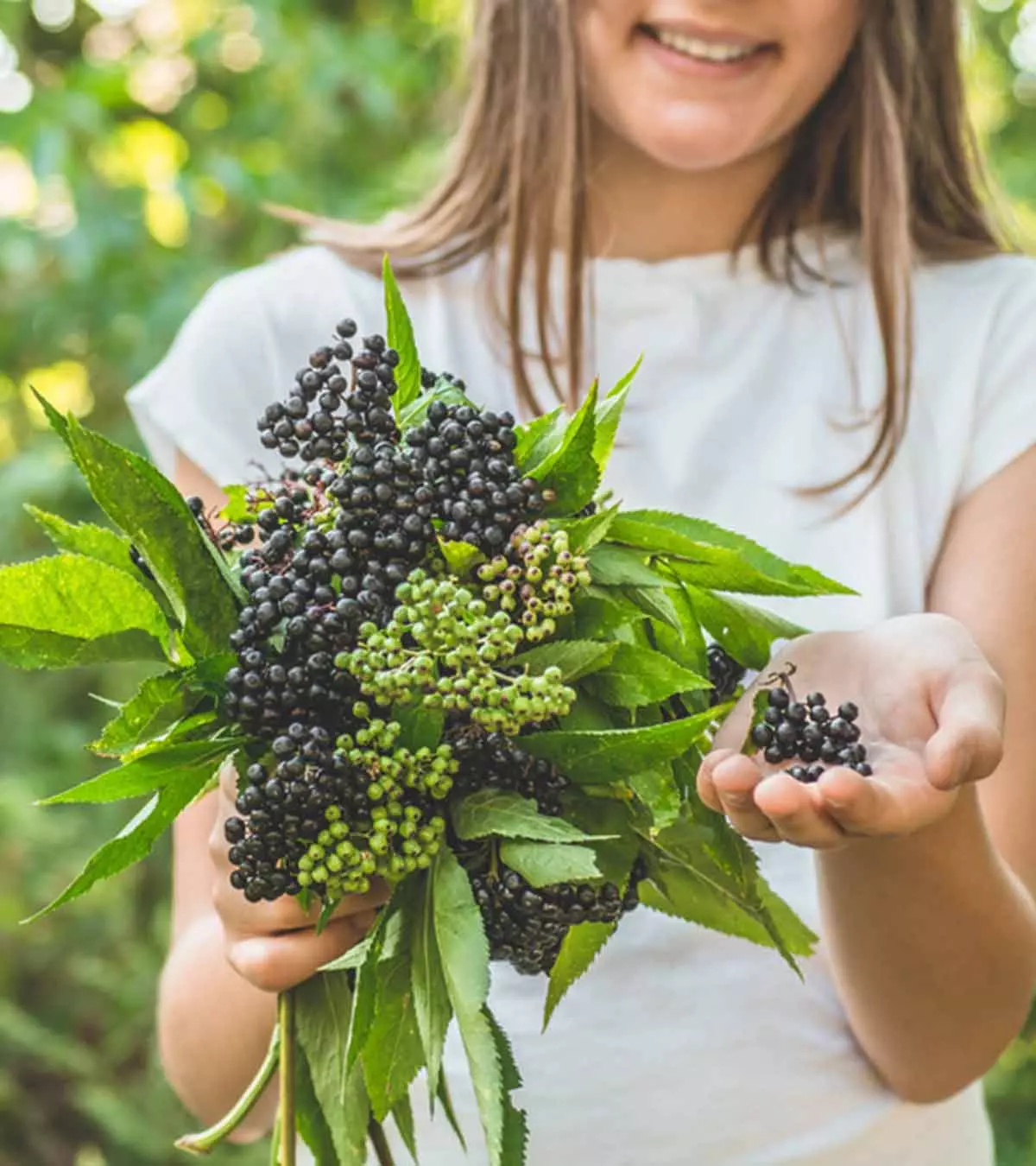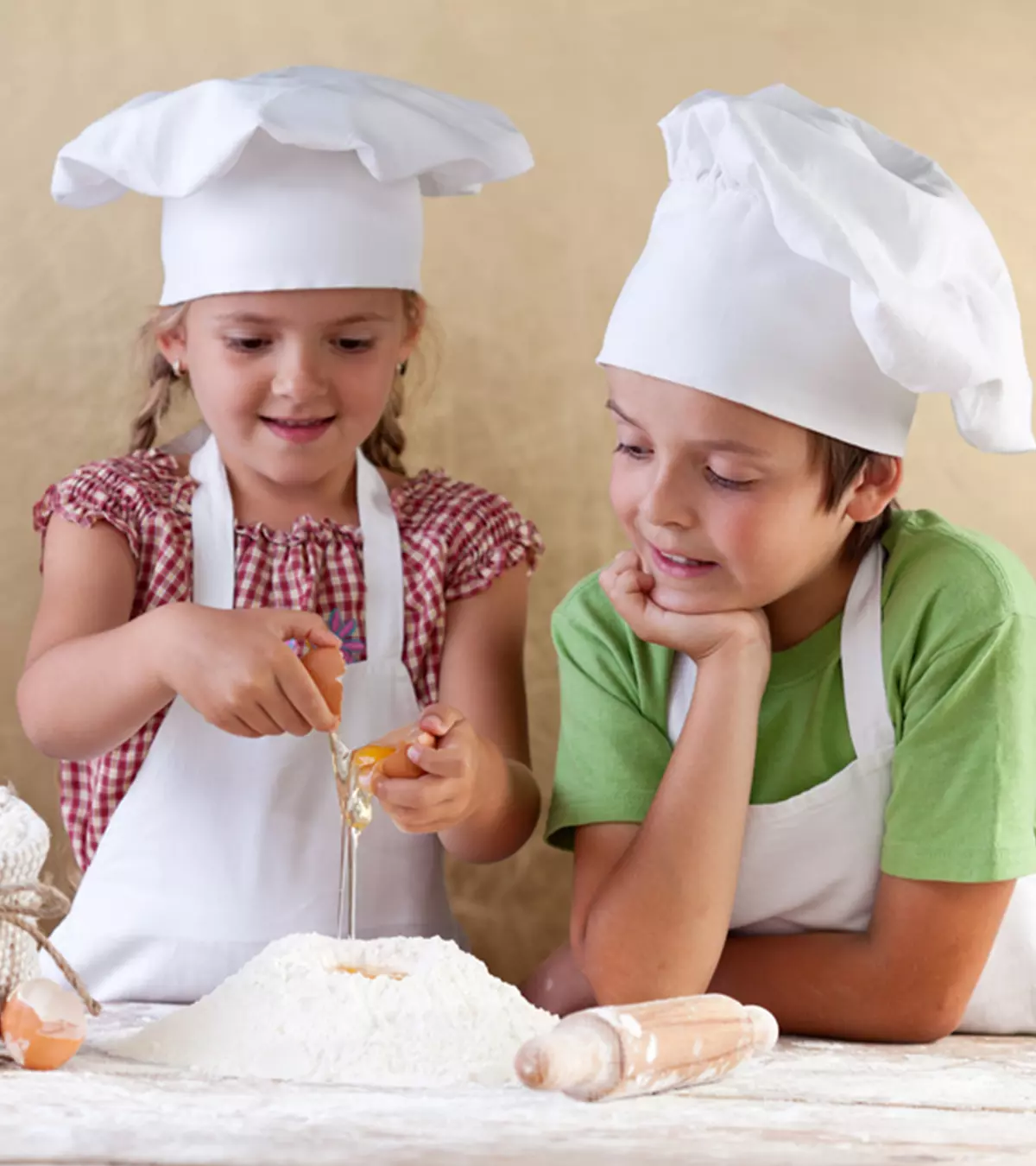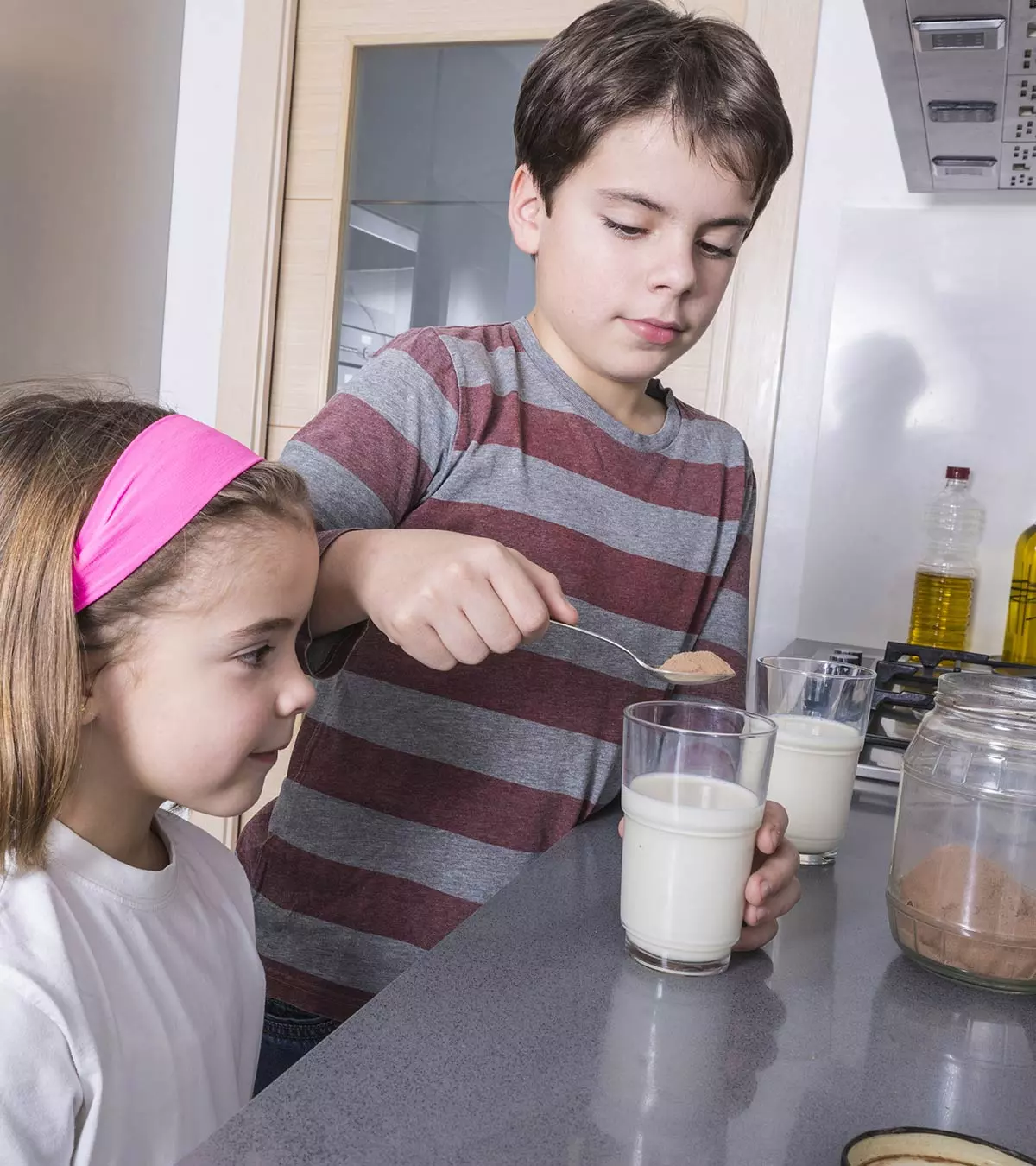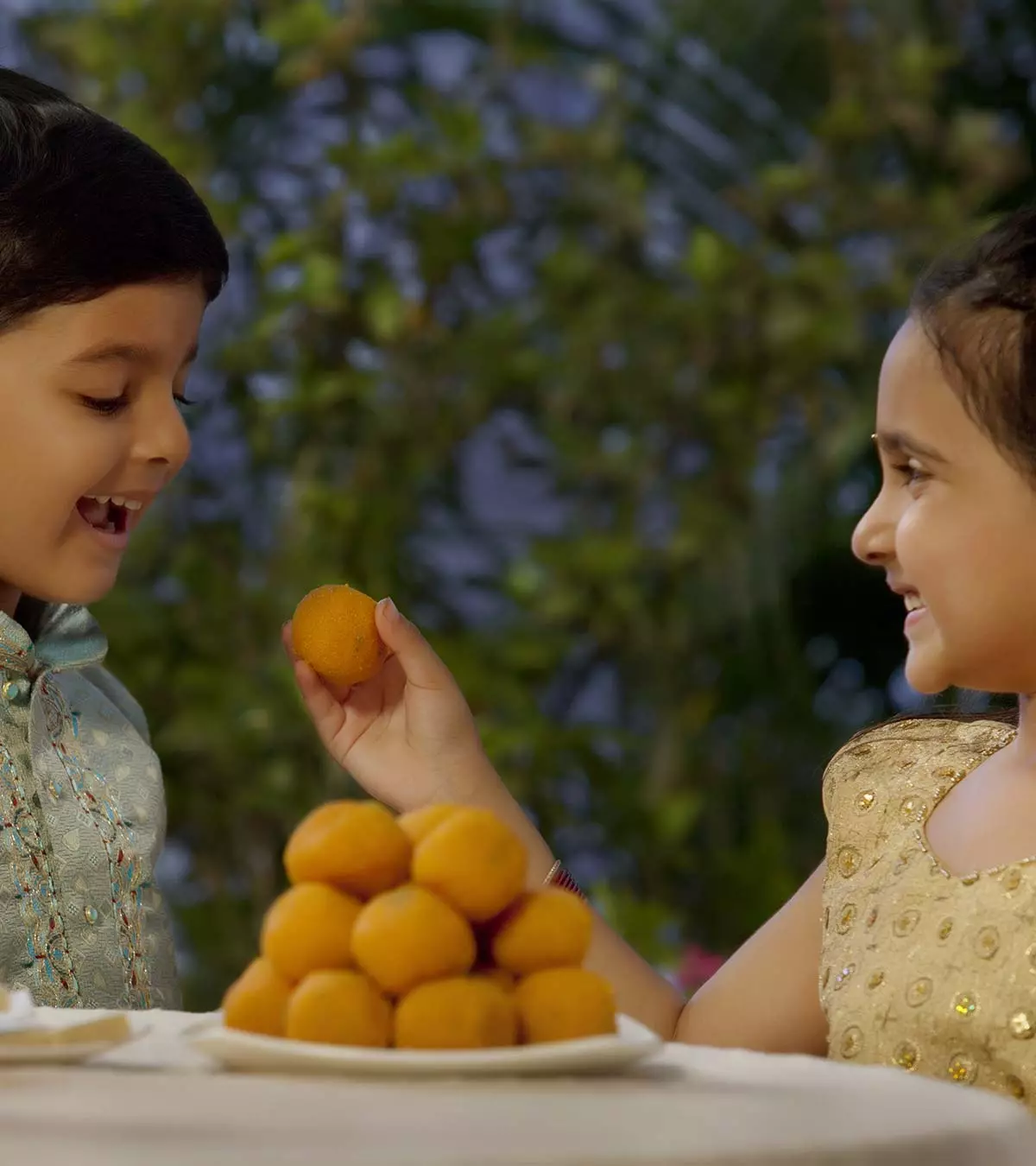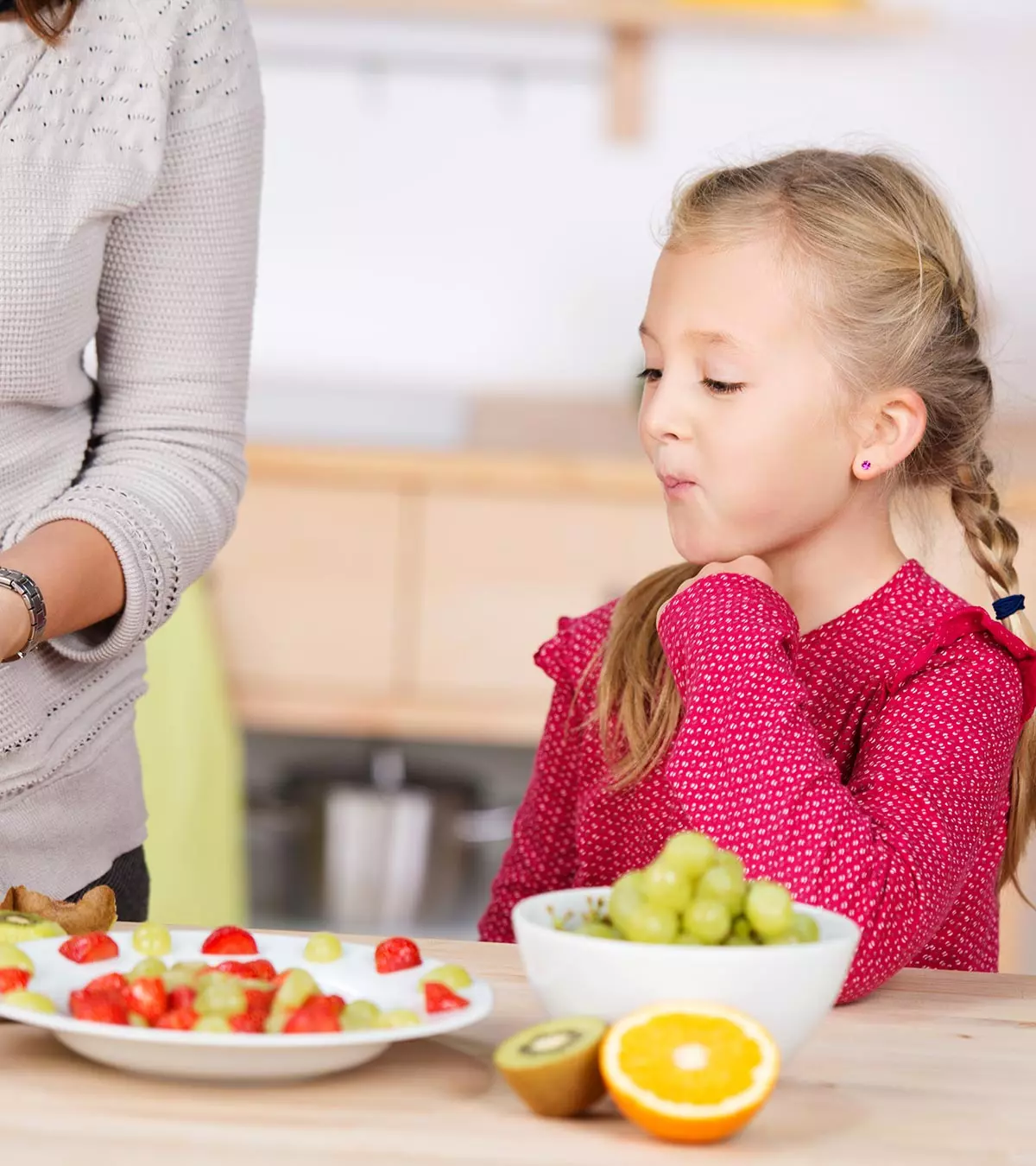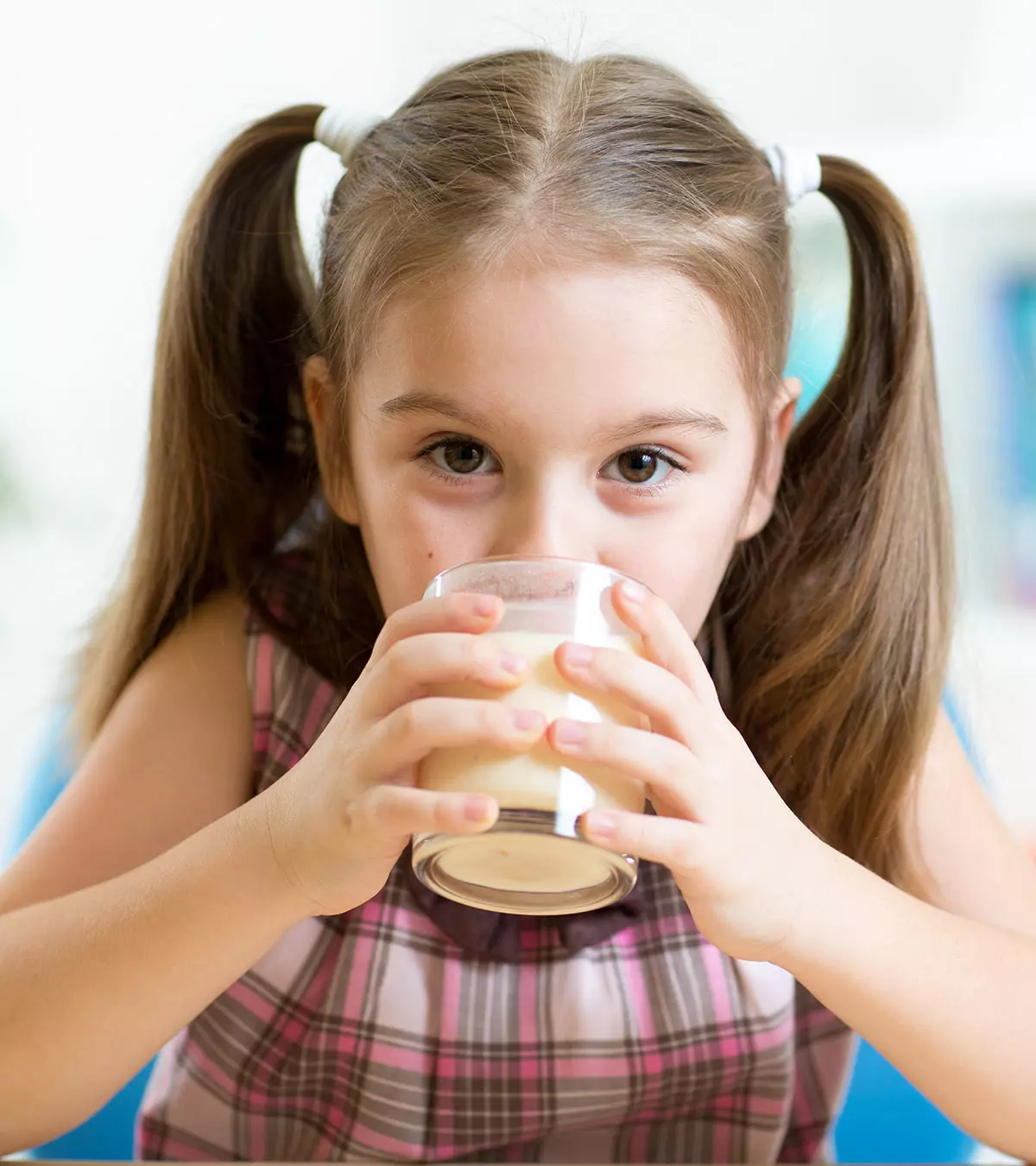
Image: ShutterStock
Water is the best source of hydration for people across ages. However, you need something more than water to keep your children nourished and hydrated. So, we bring you a list of healthy drinks for kids that will keep your child optimally hydrated. Besides, these drinks provide them with essential nutrients that will help them stay energized and active. So, explore the different nutritious drinks to try out.
Key Pointers
- Staying hydrated is critical for a child’s overall well-being.
- Water should be the primary hydrating drink for children.
- Milk, milkshakes, and smoothies are high sources of calcium and proteins.
- Pure, homemade fruit and vegetable juices without added sugar are healthy drink choices (in moderation).
- Soda, energy drinks, and sweetened teas are not recommended for children as they are high in caffeine and sugar.
- Consulting a pediatrician is ideal before offering certain drinks such as herbal teas to a child.
What Are Healthy Drinks For Kids?
Any drink that is beneficial to the body, in terms of mineral and nutrient fulfillment, is a healthy drink.
Experts highlight that milk and water are some of the healthiest drinks for children, essential for maintaining hydration and providing necessary nutrients (22). While water is one of the most healthful drinks, as it keeps the body hydrated, it does not contain enough minerals and nutrients required by the body. These mineral and nutrient requirements should be obtained from other sources such as milk, fruit juices, and some kid-friendly superfood elixirs.
Singapore-based clinical dietitian & yoga expert Nupur Agarwal advises, “Just like adults, kids need plenty of water to support their daily functions. A well-hydrated child is happy and active, and the right drinks do more than just hydrate as they also promote overall health and vitality.”
Registered pharmacist and nutritionist Sarah Gray says, “Water is the best option as a regular drink for kids. Milk is also a great option to provide additional nutrients and protein for growing bodies. Depending on age, usually 4-5 glasses of water a day is ideal for adequate hydration. Aiming for this and topping up with milk-based drinks as desired is a good place to start.”
Milk is the healthiest drink for children unless they are lactose intolerant (1). If a child can’t consume animal milk, they can relish lactose-free milk options, such as nut milk or calcium-fortified soy drinks. They may also consume lactose-free yogurt drinks and homemade protein shakes.
 Quick fact
Quick factNutritional drinks also fall in this category. They are one of the best health drinks for kids and are safe to consume. As they come in several flavors and taste delicious, kids usually like to have them. However, do make a note of the ingredients before selecting a drink.
Fresh fruit and vegetable juices are healthy for children as they are a natural source of nutrients (2). You can make them delicious by mixing natural sweeteners such as dates syrup instead of white sugar.
This chart shows the calories and sugar in different beverages. If your child needs to gain weight, you may choose the high-calorie ones, and vice versa.
| DRINK | SIZE | CALORIES | SUGAR |
|---|---|---|---|
| Water | 8 oz (240 ml) | 0 | 0 g |
| Low-fat milk | 8 oz (240 ml) | 100 | 11 g |
| 100% orange juice | 8 oz (240 ml) | 110 | 22 g |
| Juice drink (10% fruit juice) | 8 oz (240 ml) | 150 | 38 g |
| Powdered drink mix (with sugar added) | 8 oz (240 ml) | 90 | 24 g |
Health drinks require milk or water to be at a certain temperature and come with pre-added sugars, which are not in excessive amounts.
Studies suggest that children who prefer sugar-sweetened drinks may risk a calorie deficit of over 200 calories (23). Therefore, it is essential to prioritize healthy beverages and prepare nutritious drinks, like the ones listed below, to ensure children receive the necessary nutrients.
Healthy Drinks For Kids To Drink
Milk and fruit or vegetable-based drinks such as milkshakes, juices, or green smoothies, which can be made at home, are a healthy alternative to soda and soft drinks (which are harmful to kids).
They can be made with a blend of various ingredients and given different tastes such as tangy, sweet, little spicy, etc. These are a hit with kids, who want a break from mundane milk.
Nutritional Drinks for Kids
Nutritional drinks are a rich source of proteins, carbohydrates and fats. They are especially good for kids who may have eating disorders or are underweight. While having them with milk or water is good, they should not be made a permanent substitute of food. Formula nutritional drinks should be avoided for kids and could be given to older teenagers.
 Point to consider
Point to considerNutritional drinks are of three kinds (3):
1. Formula
These are disorder specific, which means they may be given to kids with acute appetite or food disorders or to cancer patients. As far as possible do not include these in everyday diet unless the doctor insists.
2. Shakes
These nutritional drinks such as Protinex or Nutrilite can be used every day as they are a staple supplement of proteins and essential nutrients.
One glass a day with milk or water helps in meeting the daily requirements of nutrients for your kid. These drinks can also be clubbed with different fruits, seeds, and nuts to make healthy nut and fruit smoothies. Moreover, milk-based drinks are better for rehydration than store-bought sports drinks (24). However, if your child has lactose intolerance, nut allergies, or any dietary restrictions, consult a healthcare professional before introducing new ingredients.
3. Electrolytes
Electrolytes contain ions which are important for the transmission of nerve impulses in the body (4). They help in maintaining muscle contractions for easy movement. There are seven main electrolytes in the human body:
- Sodium (Na+)
- Calcium (Ca++)
- Potassium (K+)
- Chloride (Cl-)
- Magnesium (Mg++)
- Bicarbonate (HCO3-)
- Phosphate (HPO4–)
One need not have to worry about electrolyte balance in the body, as regular meals help maintain that but they could sometimes be required for kids. Children get dehydrated faster than adults due to physical activity and sweating. Sweat results in the loss of electrolytes from the body and could result in a dizzy feeling.
Electrolyte drinks are useful when your child is suffering from diarrhea or loose motions, which result in severe loss of ions from the body. ORS (oral rehydration solutions) or electrolyte water helps in balancing out the lost ions by replenishing them in the body (5).
There are several electrolytes available in the market but consuming a mix of common salt (or table salt) with sugar in water is the best. Avoid manufactured electrolytes as they could dump excessive ions in the body causing problems like hypernatremia (a high amount of sodium in the blood), hyperkalemia (a high amount of potassium in the blood), etc.
Pediatricians advise parents not to give their children electrolytes other than fruit-based ones, made at home.
Homemade Electrolyte Drinks
There is not much that you have to do here. Just add in all the ingredients and blend! It is a real quick process with loads of good stuff. However, avoid adding excessive sugary sources or giving these drinks in large amounts, as they may not be ideal for children.
1. Tangy Electrolyte Drink
You Will Need
- 1/2 cup fresh orange juice
- 1/4 cup fresh lemon juice
- 2 cups of water (filtered or purified) or raw coconut water
- 2 tbsp raw honey or maple syrup
- 1/8 tsp table salts
How To:
- Mix all the ingredients well.
- Store in a glass jar, though drinking it immediately is better.
Why Choose It?
Lemons are not just easily available, but also contain potassium, calcium, and magnesium, which are the most basic electrolyte requirements of a human body. A lemon and orange drink will also prevent kids from heat strokes in summers and keep them well hydrated.

2. Cool Coconut Drink
You Will Need
- 3 cups of coconut water
- 1 cup water (the amount of water would depend on how strong you want the drink to be)
- 1/2 cup freshly squeezed lime juice
- 1/4 teaspoon salt
- 2tbsp raw honey
How To:
- Mix all the above ingredients well.
- Serve chilled.
Why Choose It?
Coconut water is a good source of vitamin C, riboflaviniAnother name for vitamin B2 found in food and dietary supplements. , and calcium. It also contains dietary fiber, magnesium, potassium, and manganese (6). Coconut water for kids can be a refreshing summer and kid party drink, which is energizing at the same time. The only downside is that it is high in calories.

3. Strawberry Coconut Mix
You Will Need
- 3 cups of coconut water
- 1 cup of strawberries
- 1 cup of fresh water
- 1 cup of ice
- 1/8 teaspoon of sea salt
- 2 tablespoons natural sugar or honey, to taste
How to:
- Put all the above ingredients in a blender and blend well.
- You can serve it with or without ice.
Why Choose It?
Strawberries are a source of vitamin C, manganese, folate (B9), and potassium. This is not just an ordinary electrolyte drink (7). It is also a Halloween, Christmas, or any other occasion and theme party drink for kids.

Fruit And Vegetable Drinks
Fruits and vegetables provide a major chunk of dietary fibers, vitamins, and nutrients in the body and help in reducing the risks of some diseases and disorders. Obesity, heart diseases, blood pressures, and even a few cancers could be avoided with a good supply of fruits and vegetables in the daily diet. (8)
We list here a few tasty, easy. and healthy juice drinks for kids made from fruits and vegetables, for you.
4. The CPR Drink
The carrot, pear, and orange mix is one the healthiest drinks to have.
You Will Need
- 1 big red or orange carrot
- 1 big pear
- 1 or 2 oranges
- 1 teaspoon honey
- A few mint leaves
How To:
- Blend all the ingredients in a blender.
- Add honey and a hint of mint leaves to garnish.
Why Choose It?
Carrot is one of the best anti-oxidants, which means that it will flush harmful oxygen from the body. It is also rich in fiber and beta-carotene. Pears keep cholesterol levels down and are rich in vitamins C, K, B2, B3, and B6. Moreover, oranges are rich in vitamin C and electrolytes (25). This drink can help boost immunity and digestion, making it a great choice for a nutrient boost or when children need extra energy.
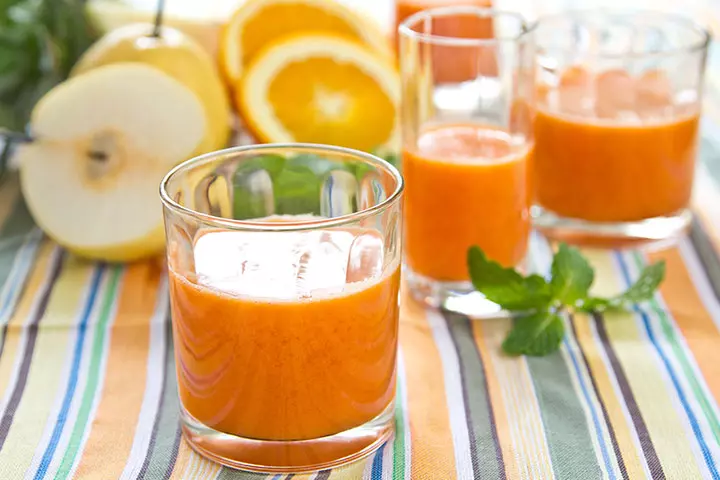
5. Melon Berry Squash
This pretty glass of creamish red will boost your kid with energy.
You Will Need
- About three cups of cut watermelon
- 1 cup of strawberries or raspberries
- 1 teaspoon lemon
- 1 tablespoon honey
How To:
- Add all the ingredients in a blender and blend well.
- Serve chilled.
Why Choose It?
Raspberries contain strong antioxidantsiCompounds that prevent cell damage caused by free radicals. such as vitamin C, quercetiniA plant flavonoid that gives fruits, flowers, and vegetables their color. , and gallic acidiAn acid found in tea leaves, oak bark, sumac, and others. . These help in fighting against cancer, heart and circulatory diseases, and age-related decline. Watermelons, though mostly watery, are packed with vitamins A, B6, and C, lycopene (a naturally occurring chemical which prevents heart disorders), antioxidants, and amino acids.
6. Green Magic
Most kids hate greens, but here is something that will make your child want more of this.
You Will Need
- A few leaves of spinach and kale
- 1 cup of strawberries
- 1/2 tablespoon lemon
- 1-1/2tbsp honey
- Mint leaves to garnish
How To:
- Juice the greens and strawberries together.
- Add some ginger and blend again.
- Add honey and garnish with mint leaves.
Why Choose It?
Besides being a nutrient blast, kale is low in calories, high in fiber and zero in fat (9). It is the perfect energy booster for your kid.
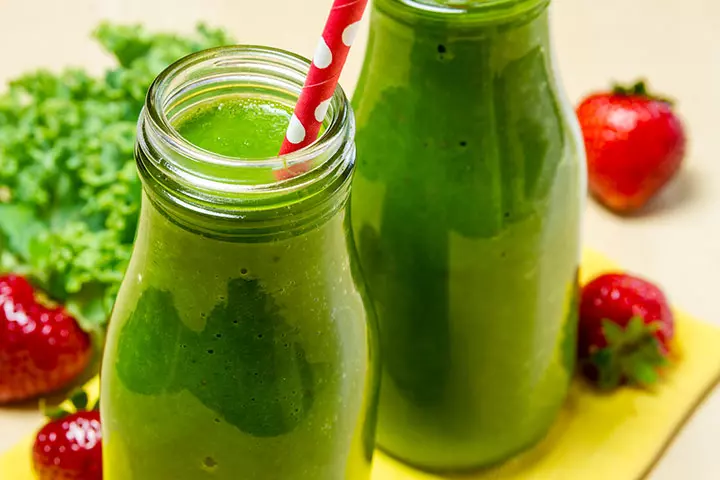
7. Green Orange Punch
This drink is full of healthy stuff and less green in color to prevent your kid from fussing around.
You Will Need
- 1 cup of kale
- 1 cup of collard greensiThe cruciferous vegetables such as turnips, cabbage, and other green leafy vegetables.
- 1/4 cucumber
- 1 medium sized carrot
- 1 tomato
- 1/2tbsp lemon juice
- 1/2 cup of blueberries
- 2tbsp of honey
How To:
- Mix all the ingredients in a blender and blend well.
- Serve without ice.
Why Choose It?
One cup of collard greens contains 63 calories, five grams of protein, one gram of fat, and 11 grams of carbohydrates. Blueberries lower the amount of cholesterol in the body. This drink enhances energy while taking care of the heart. What’s best? You can freeze it in ice cream molds to serve your child delectable and healthy homemade popsicles.
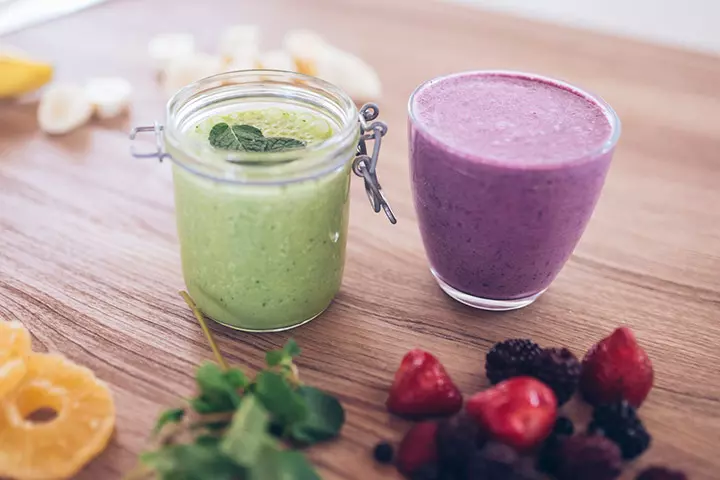
8. Watermelon Lemonade
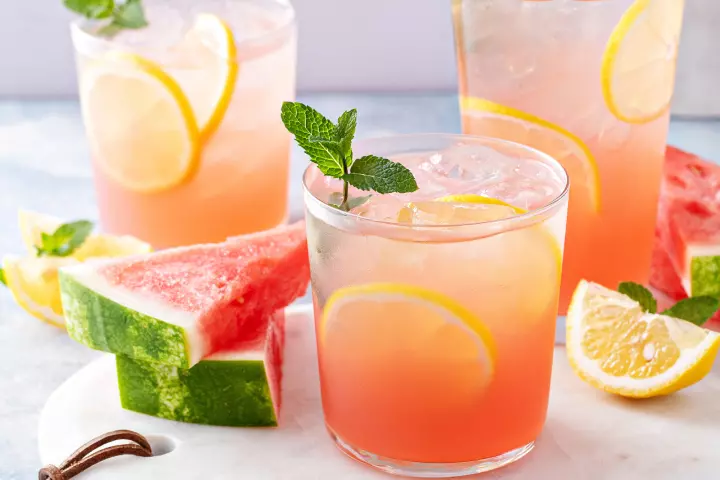
This cooling drink provides a splash of color to your child’s regular lemonade. It contains lemon juice, watermelon, and honey that offer several nutrients and bioactive compounds.
You Will Need
- 3 cups of watermelon cubes
- Freshly squeezed juice of two lemons
- 3tbsp honey
- ½tsp salt
- 3 cups of cold water
How To:
- Take watermelon cubes in a blender and make a smooth puree
- Strain the puree through a coarse mesh to extract juice while retaining some pulp
- Add lemon juice, salt, honey, and water
- Serve it fresh
Why Choose It?
Lemons are a storehouse of vitamin C, while each cup of watermelon provides 864IU vitamin A, 12mg vitamin C, 460mcg beta carotene, 170mg potassium, and 10.64mg calcium. This makes the drink packed with antioxidants while being immensely hydrating (10) (11) (12). Your child is sure to love the tangy-sweet taste combination.
Herbal Teas
Though ordinary teas could contain a high amount of caffeine, herbal teas help in detoxifying the body. However, do not give these herbal drinks to children every day. Reserve them for the days when they have a digestion problem or a cold / throat infection Instead, give your child infused water prepared by steeping fruits and refreshing herbs, such as mint in water.
Though these drinks are named tea, they do not contain tea.
 Be watchful
Be watchful9. Ginger Tea
You Will Need
- A small piece (size of a marble) of ginger
- 2tbsp of honey
- 1/2tbsp of lime juice
- 2 cups of water
How To:
- Crush or mince the ginger.
- Add it to water and boil for 10 to 15 minutes.
- Add the honey and lemon juice in it.
Why Choose It?
Ginger is very effective against digestive issues, protects liver, and provides relief from a cough and cold (13). Ginger also fights perfectly against respiratory diseases like influenza, bronchitis, whooping cough, etc.
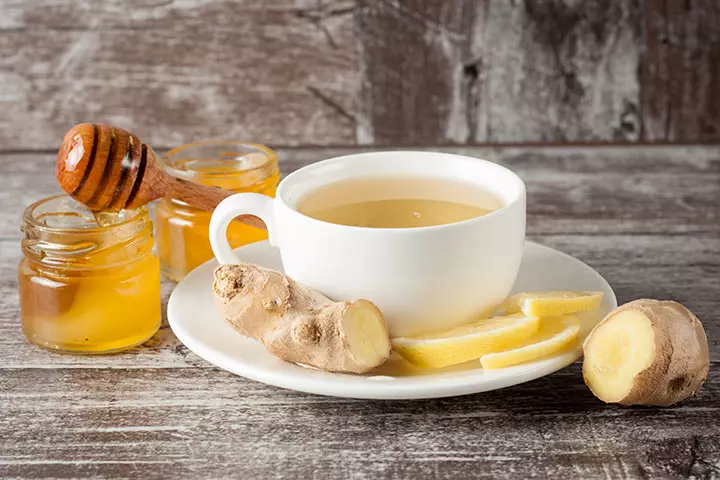
10. Lemon Balm Tea
You Will Need
- A stalk of lemon balm leaves
- 1tbsp honey
- 1/2tsp lemon juice
- 2 cups of water
How To:
- Boil water for 10 minutes and switch off the heat.
- Put the leaves in the hot water and lid it for 10 to 12 minutes.
- Now take off the leaves and add honey and lemon juice.
Why Choose It?
Lemon balm is very effective in preventing your kid from microbial infections, strengthening the nervous system, and fighting against cancer causing elements. It also provides relief from gastric issues (14).
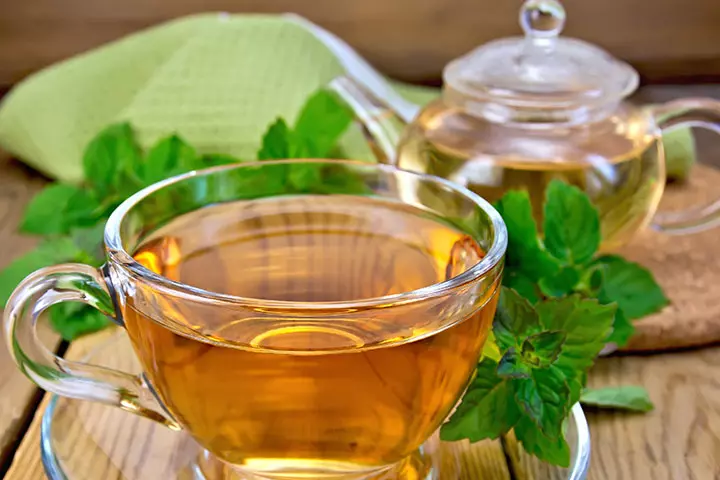
11. Cardamom Tea
You Will Need
- Cardamom seeds of at least four pods
- Water
How To:
- Take out the seeds of at least four pods and pound them in a mortar pestle.
- Add the pounded seeds in a pan of water and boil for 15 minutes.
- Have it when lukewarm.
Why Choose It?
Cardamom provides relief from stomach ache and flatulenceiPassing of gas from the digestive system through the anus. , and respiratory and pulmonary diseases. It reduces phlegm.
Tips For Introducing Healthy Drinks To Kids
The American Academy of Pediatric Dentistry (AAPD) advises following healthy drinking habits in children as part of a balanced diet to maximize the intake of essential nutrients (26). Here are some practical tips to introduce your child to healthy beverages (27) (19).
- Lead by example: Children tend to follow healthy habits when they see their parents make good choices. So, choose nutrient-rich drinks and set the right example.
- Offer healthy choices: Offer fresh juices, smoothies, or plain milk during snack time. Make these beverages at home rather than buying them from stores to provide healthier options.
- Limit sugary drinks: Refrain from offering sodas and caffeinated beverages to children. It will help reduce excess sugar consumption and encourage healthier drink choices.
- Make healthy drinks fun: Use colorful cups, fun straws, and creative ice shapes to make water and other healthy drinks more appealing to children.
- Educate about healthy choices: Introduce children to the benefits of healthy drinks by reading books and sharing stories. Involve them in choosing and preparing their beverages to encourage healthy dietary habits.
- Create a routine: Set regular meal and snack times with healthy drink options to help children build healthy habits. Also, carry healthy drinks with you when traveling.
- Be patient: Give children ample time to explore their options and offer rewards for choosing healthy drinks.
- Consult for personalized advice: If considering flavored drinks or herbal teas, consult a pediatrician to ensure they are safe for children.
Frequently Asked Questions
1. Is it safe for children to drink sports drinks?
Sports drinks can include fitness waters and energy drinks. They mainly contain glucose or sugar, caffeine, herbal ingredients, sweeteners, and other ingredients, whose effects on children are unknown. Therefore, the intake of such drinks must be avoided (15).
2. Is it okay for children to drink diet or sugar-free drinks?
Diet or sugar-free drinks contain artificial sweeteners and flavor enhancers, which are non-nutritive and have potential side effects. Therefore, children must not consume such beverages (16). Catherine Rall, a registered dietitian and nutritionist from Denver, Colorado, explains, “It is best to avoid carbonated soft drinks due to their high sugar content and lack of nutritional value. Children should drink plenty of water and moderate amounts of milk, fruit juices, and non-carbonated sports drinks (sometimes). They can also enjoy caffeine-free teas, either iced or hot.”
3. How much fruit juice should kids consume daily?
Children between the ages of four and six years can consume a maximum of 4-6oz. fruit juice daily and children/ teens between the age of seven and 18 can have a maximum 8oz. juice daily (16).
5. What are some common myths about kids’ drinks?
While there are several myths surrounding kids’ drinks, here are the two most common ones (20).
- All fruit juices are healthy for kids: Some packaged fruit juices contain added sugars or sweeteners, flavoring, preservatives, colors, and other synthetic substances. These ingredients reduce the nutritional content of the drink. Children may instead be given whole fruits to obtain maximum benefit.
- Sports drinks are necessary for young athletes: Sports drinks may contain excessive sugar and salt, making them unhealthy, especially when consumed in excess. These may also contain caffeine, which can affect the child’s sleep patterns and concentration (21).
Hydration is one of the most important things for your overly active and growing child. While there is no drink that can replace the goodness of water, only water is not enough to provide all the necessary nutrients. Milk, juices, soups, milkshakes, and fermented drinks, such as kefir are some healthy homemade drinks for kids. Smoothies for kids are another healthy beverage option that can give optimum nourishment. If your child is suffering from diarrhea or vomiting, electrolyte drinks can help replenish the lost salts from your child’s body and help them recover faster. Avoid adding excessive amounts of sugar to your child’s drinks.
Infographic: OTC Health Drinks For Kids
Several over-the-counter health beverages are being formulated to promote children’s overall development. These products are constantly modified for better results. However, before you use them, know about the nutrients a health drink should have. Illustration: Momjunction Design Team
Illustration: Healthy Drinks For Kids (Besides Water)
_illustration.jpg.webp)
Image: Stable Diffusion/MomJunction Design Team
This informative video discusses the best drinks to keep your child healthy! Discover which drinks are best for your child’s health and nutrition from an expert.
References
- Recommended Drinks for Young Children Ages 0-5.
https://www.healthychildren.org/English/healthy-living/nutrition/Pages/Recommended-Drinks-for-Young-Children-Ages-0-5.aspx - New Guidelines Recommend Best Beverages For Your Child.
https://www.uhhospitals.org/blog/articles/2020/06/new-guidelines-recommend-best-beverages-for-your-child/ - Supplemental nutrition drinks: help or hype?.
https://www.health.harvard.edu/staying-healthy/supplemental-nutrition-drinks-help-or-hype - Electrolytes.
https://www.ncbi.nlm.nih.gov/books/NBK541123/ - Oral Rehydration Therapy.
https://www.utmb.edu/pedi_ed/corev2/fluids/Fluids11.html - Coconut Water.
https://nutrition.org/coconut-water/ - What’s in a strawberry?
https://fruitsandveggies.org/expert-advice/whats-in-a-strawberry/ - Fruit and vegetables.
https://www.betterhealth.vic.gov.au/health/healthyliving/fruit-and-vegetables - Kale.
https://hsph.harvard.edu/department/nutrition/ - Why Watermelon Should Be Part of Your Diet.
https://health.clevelandclinic.org/benefits-of-watermelon - 7 Reasons to Start Your Day With Lemon Water.
https://health.clevelandclinic.org/benefits-of-lemon-water - Nutrition Facts: Watermelon, raw, 1 cup, diced.
https://www.uhhospitals.org/health-information/health-and-wellness-library/article/nutritionfacts-v1/watermelon-raw-1-cup-diced - The Amazing and Mighty Ginger.
https://www.ncbi.nlm.nih.gov/books/NBK92775/ - Lemon Balm.
https://www.peacehealth.org/medical-topics/id/hn-2121004 - Sports Drinks and Energy Drinks.
https://kidshealth.org/en/parents/power-drinks.html - Sweeteners and Sugar Substitutes: Parent FAQs.
https://www.healthychildren.org/English/healthy-living/nutrition/Pages/Sweeteners-and-Sugar-Substitutes.aspx - How to reduce added sugar in your child’s diet.
https://www.healthychildren.org/English/healthy-living/nutrition/Pages/How-to-Reduce-Added-Sugar-in-Your-Childs-Diet.aspx - Chocolate Milk For Kids: Healthy Or Not?
https://www.aicr.org/resources/blog/chocolate-milk-for-kids-healthy-or-not/ - Healthy Drinks For Kids And Teenagers.
https://raisingchildren.net.au/toddlers/nutrition-fitness/healthy-eating-habits/healthy-drinks - Common Sugary Drink Myths Explained.
https://uconnruddcenter.org/wp-content/uploads/sites/2909/2020/09/Common-Sugary-Drink-Myths-Explained-1.pdf - Caffeine and Kids.
https://www.cuimc.columbia.edu/news/caffeine-and-kids - Healthy Drinks for Kids.
https://www.childrensmn.org/educationmaterials/parents/article/10269/healthy-drinks-for-kids/ - Anisha I Patel et al., (2013); Sociodemographic Characteristics and Beverage Intake of Children Who Drink Tap Water.
https://pmc.ncbi.nlm.nih.gov/articles/PMC4452285/#R6 - Ben Desbrow et al., (2014); Comparing the rehydration potential of different milk-based drinks to a carbohydrate-electrolyte beverage.
https://pubmed.ncbi.nlm.nih.gov/25315686/ - Health Benefits Of Fruits And Vegetables.
https://dirhorti.assam.gov.in/sites/default/files/swf_utility_folder/departments/horticulture_medhassu_in_oid_5/portlet/level_1/files/Health%20benifit%20of%20fruits%20%26%20vegetable.pdf - Healthy Beverage Consumption in Early Childhood: Recommendations from Key National Health and Nutrition Organizations: Summary of Oral Health Considerations.
https://www.aapd.org/globalassets/media/policies_guidelines/e_healthybev.pdf - Encouraging Your Child to Drink Water.
https://eclkc.ohs.acf.hhs.gov/publication/encouraging-your-child-drink-water#:~:text
Community Experiences
Join the conversation and become a part of our nurturing community! Share your stories, experiences, and insights to connect with fellow parents.
Read full bio of Huda Shaikh

Sarah Gray is a qualified and registered pharmacist and nutritionist, with over 25 years of experience. Her expertise relates to integrative nutrition and holistic support for a healthy diet and lifestyle. In specific, Sarah is an expert in supplements and managing hormones in women’s midlife. She offers her services through her online clinic.
Sarah Gray is a qualified and registered pharmacist and nutritionist, with over 25 years of experience. Her expertise relates to integrative nutrition and holistic support for a healthy diet and lifestyle. In specific, Sarah is an expert in supplements and managing hormones in women’s midlife. She offers her services through her online clinic.
- Nupur Agarwal specializes in food & nutrition, yoga & Reiki healing. She is the founder of Prakrutik Health Clinic and has 15 years of experience in helping her clients lead a healthy life through a holistic approach that includes nutritious food, yoga, nature care and changes in their lifestyle.
 Nupur Agarwal specializes in food & nutrition, yoga & Reiki healing. She is the founder of Prakrutik Health Clinic and has 15 years of experience in helping her clients lead a healthy life through a holistic approach that includes nutritious food, yoga, nature care and changes in their lifestyle.
Nupur Agarwal specializes in food & nutrition, yoga & Reiki healing. She is the founder of Prakrutik Health Clinic and has 15 years of experience in helping her clients lead a healthy life through a holistic approach that includes nutritious food, yoga, nature care and changes in their lifestyle. - Catherine Rall is a registered dietitian with more than five years of experience in the nutrition industry. She holds a bachelor’s degree in health science and dietetics from the University of Rhode Island and a business management degree from The American College of Greece.
 Catherine Rall is a registered dietitian with more than five years of experience in the nutrition industry. She holds a bachelor’s degree in health science and dietetics from the University of Rhode Island and a business management degree from The American College of Greece.
Catherine Rall is a registered dietitian with more than five years of experience in the nutrition industry. She holds a bachelor’s degree in health science and dietetics from the University of Rhode Island and a business management degree from The American College of Greece.
Read full bio of Swati Patwal
Read full bio of Rohit Garoo
Read full bio of Dr. Joyani Das






